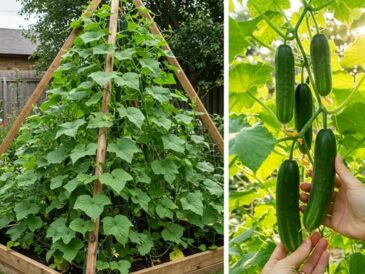Materials Needed:
- Standard aspirin tablets (325 mg or 500 mg size)
- Clean water (preferably filtered or rainwater)
- Measuring container or jug
- Spray bottle or watering can
Preparing the Aspirin Solution
- Dissolve One Tablet: Crush or drop one aspirin tablet into one liter (about one quart) of water. Stir well until completely dissolved.
- Use Fresh Solution: Prepare fresh each time you plan to apply, as the solution degrades over time.
Application Methods
- Foliar Spray: Using a spray bottle, lightly mist the leaves of your tomato, cucumber, or pepper plants. This helps the plant absorb the aspirin directly through the stomata (tiny pores on leaves).
- Soil Drench: Pour the aspirin solution around the base of the plant, soaking the root zone. This supports root growth and nutrient uptake.
Frequency of Application
- Apply once every 7 to 14 days during the active growing season.
- Avoid over-application to prevent possible phytotoxicity (leaf burn or stress).
Best Time to Apply
- Early morning or late afternoon, when temperatures are cooler and plants can absorb the solution without rapid evaporation.
Why Aspirin Is a Game Changer for Tomatoes
Tomatoes are arguably the most popular vegetable garden crop, but growing large, flavorful, and disease-resistant tomatoes is challenging due to their susceptibility to pests and environmental stresses.
Aspirin Benefits for Tomato Plants:
- Stronger Immunity: Protects against blights and fungal diseases.
- Enhanced Flowering: Encourages more blossoms, increasing fruit potential.
- Improved Fruit Size: Stimulates cell expansion and nutrient transport.
- Stress Mitigation: Helps tomatoes endure heat waves or cold snaps.
Many gardeners report that aspirin-treated tomato plants produce fruits up to 25-30% larger and more uniform in shape and color.
Aspirin’s Effect on Cucumbers: Crisp and Abundant Harvests
Cucumbers thrive when their environment is stable and stress-free. Aspirin helps cucumbers by:
- Reducing Powdery Mildew: One of the most common cucumber diseases.
- Stimulating Vigorous Growth: Leads to longer, crisper cucumbers.
- Improving Pollination: Healthier plants attract more pollinators, boosting fruit set.
With aspirin treatment, expect cucumbers to mature faster and with fewer deformities.
Peppers and Aspirin: Bigger, Juicier, and More Vibrant
Peppers require precise nutrient balance and pest control for optimal yields. Aspirin enhances pepper growth by:
- Increasing Disease Resistance: Less vulnerable to bacterial spot and fungal infections.
- Promoting Uniform Ripening: More consistent color development.
- Enhancing Fruit Firmness: Resulting in juicier and meatier peppers.
Gardeners using aspirin consistently observe heavier pepper clusters and stronger plants capable of supporting larger fruits without breakage.
Integrating Aspirin into Your Gardening Routine: Best Practices
- Combine with Organic Fertilizers: Use aspirin alongside compost or organic feeds to maximize nutrient availability.
- Monitor Plant Response: Adjust application frequency based on growth stage and environmental conditions.
- Avoid Overuse: Excessive aspirin can stress plants; moderation is key.
- Complement with Good Gardening Habits: Proper watering, mulching, pruning, and pest control amplify aspirin’s benefits.
- Protect Pollinators: Apply in early morning or late evening to avoid harming bees and beneficial insects.
Potential Risks and Considerations
- Not a Miracle Cure: Aspirin aids plant health but does not replace good soil management or pest control.
- Effect on Beneficial Insects: Over-spraying may affect bees; use responsibly.
- Plant Sensitivity: Some species might react negatively; test on a small batch first.
- Environmental Concerns: Avoid runoff into waterways.
FAQs About Aspirin Use in the Garden
Can I use any aspirin tablet for my plants?
Use standard aspirin tablets without coatings or additives for best results.
Will aspirin work on all plants?
It works best on tomatoes, cucumbers, peppers, and many flowering plants but may vary with other crops.
How soon will I see results?
Positive effects can appear within 1-2 weeks after application.
Can aspirin replace fertilizers?
No, it supplements but doesn’t replace essential soil nutrients.
Additional Tips for Growing Larger Vegetables
- Soil Testing: Know your soil pH and nutrient levels.
- Consistent Watering: Keep soil evenly moist, avoid water stress.
- Proper Spacing: Allow airflow to reduce disease risk.
- Use Mulch: Retains moisture, suppresses weeds.
- Pruning and Training: Helps direct energy to fruits.
Real Gardeners’ Testimonials
- “After adding aspirin to my tomato watering schedule, my fruits nearly doubled in size. I couldn’t believe the difference!” – Sarah M.
- “My cucumber plants were always small and patchy. Aspirin sprays gave me a bountiful and healthy harvest this year.” – Daniel K.
- “I was skeptical at first, but the peppers grew bigger and the plants looked so vibrant after using aspirin. Definitely recommend!” – Linda P.
Conclusion: Unlock Your Garden’s Potential with a Simple Tablet
If you want to experience massive tomatoes, cucumbers, and peppers, the answer might be sitting in your medicine cabinet. Aspirin, an everyday household item, holds powerful benefits for plant health and productivity. By mimicking the plant’s natural defense chemical, it activates growth, boosts immunity, and helps plants overcome stress.
This affordable and accessible method is a must-try for any gardener aiming for big, juicy harvests with minimal chemical inputs. Integrate aspirin into your routine, follow best practices, and watch your garden transform into a lush, productive paradise.
Start today—your garden and your taste buds will thank you.
Happy Gardening and Bountiful Harvests!




